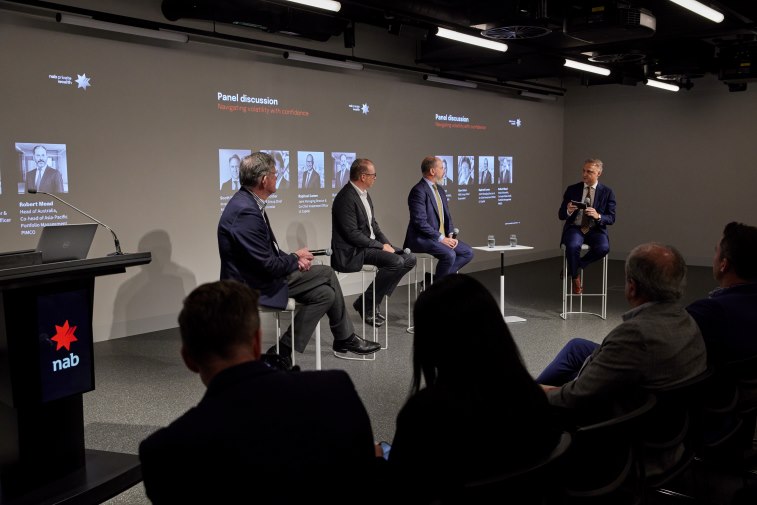We've captured the standout insights from the event series in an investor-ready eBook.


Report
PIMCO Head of Australia Robert Mead and L1 Capital CIO Rafi Lamm join NAB Private Wealth’s Scott Newitt to discuss market opportunities.

The right information is vital to make informed investment decisions. Whether it’s navigating the stock market, traversing fixed income, or exploring new avenues, having a solid understanding of market trends and opportunities is essential.
NAB Private Wealth sat down with two respected experts to get their take on where investors should be focusing.
Robert: “The most important theme impacting asset allocation decisions is that ‘bonds are back’. In an interest rate environment that is now likely to be ‘higher for longer’, investors must recalibrate their strategies accordingly. Starting yields are currently attractive for fixed income investors, with the potential for capital appreciation over the coming years. Fixed income investors are navigating a complex landscape marked by uncertainty surrounding inflation, growth and central bank policy, which is the perfect environment for active management.
Central banks have made significant progress on inflation, but given low levels of unemployment, services inflation is proving to be sticky. Amid this uncertainty, an additional benefit of bonds is their potential to weather a variety of economic conditions, particularly since we expect the traditional low correlation between stocks and bonds to resume.”
Rafi: “Firstly, on the supply side, the hurdles to getting major projects up today are like nothing I’ve seen over the last twenty years. These come from all sides like cost of funding due to higher interest rates, higher expectations of equity markets, regulatory red tape, native title issues or capex issues, especially in Australia.
And secondly, on the demand side of things, globally as the standards of income and wealth increase, a big portion of the global population are driving demand through the cycle as they want to have cars, air conditioning units, mobile phones, etc. Even though there will be cyclical highs and lows, it’s creating a very strong, sustainable trend that supports commodities prices, along with the metal-intensive processes inherent in the energy transition.
On a five-to-ten year outlook, it should be positive for mining equities in the Aussie market and should be positive for the country generally.”
Opportunities
Robert: “As the trajectories of major economies diverge more noticeably, central banks, which tightened policy in unison to curb the pandemic inflationary spike, will likely follow varied paths when cutting interest rates.
This divergence in global markets presents some compelling opportunities for fixed income investors. The repricing of assets has significantly increased yields, with fixed income assets now offering potential returns between around 6% and 15-20%, compared to 1%–6% two years ago. Notably, Japan’s shift from negative to positive policy rates marks a historic moment, with all major developed market central banks now having positive policy rates. We see bond markets outside the U.S. representing attractive relative value opportunities. Some of our highest conviction positions are being underweight to Japan, while favouring floating-rate mortgage environments like the UK and Australia.
Domestically, investors can achieve a 6-7% return from conservative, high quality, and liquid core bond portfolios, with potential for higher returns if investors are comfortable to take on additional credit risk”.
Rafi: “If you think about global investors today, a lot of investors are following what’s worked over the last few years, like U.S. big caps, Tech, etc. These ‘favourites’ are now typically trading at pretty high multiples. We think in many cases, those companies are outstanding companies and will continue to do well, but I caution people to be a little bit more careful around investing in yesterday’s winners.
We think the best opportunities are often going to be found in solid companies that have done less well over the last few years. These companies now have more attractive valuations and market expectations are lower due to being overlooked.
We are finding many of these opportunities in Europe, particularly in the U.K. Even though the latest inflation print wasn’t great there, we think there’s more space for rate cuts. We’ve recently invested in a U.K. bank and in Tesco – the U.K.’s number one supermarket chain, who are holding or growing market share and doing buybacks. We bought Tesco at around ten times P/E.
In the case of metals and mining sector, uranium is one area that’s had very little love for the past decade, although it’s been a little bit hot lately. Another attractive sector is gold. We’re buying quite a few gold companies on 20-30% percent free cash flow yields over the next couple of years.
So, my best advice is to try to focus on the areas where the market is not obsessed today, but where they might be obsessed about in 6, 12 or 18 months’ time”.
Risks and Emotions
Robert: “At PIMCO, we’ve long believed that behavioural science can make us better investors and help our clients make better investment decisions. Investors should remain vigilant about biases, such as overconfidence, and should rigorously stress-test their portfolios and investment theses against various alternative scenarios.
Emphasising the importance of maximising risk-adjusted returns rather than merely aiming for the highest returns is crucial. Additionally, the cost of de-risking is currently low, making it an opportune time to build optimal and diversified portfolios. This is particularly important given that equity valuations are fair to fully valued, underscoring the need for a balanced approach to risk management in the current economic environment”.
Rafi: “My number one piece of advice is to always think as independently as you can. Use common sense. Do your own work. Think for yourself. Then you’ll have a better gauge of what doesn’t feel right or doesn’t make sense, even if the market says that it does.
Number two is always try to anchor your thinking on valuation. Think about what’s the long-term cash flow look like, and what’s the IRR? (Internal rate of return), which is the time-weighted return of the investment. Also, based on the risks of the asset, will it be worth your while?
As share prices change and analyst valuations change all the time, you need to think about what’s something really worth to get a rough guide for when you should be buying and when you should be selling.
Number three, try to read widely. You know, often people read The Age or they read The Australian, but they won’t read both. I think it’s important to try to read from different sources, to always see the other side. And read a lot. Find some managers and advisers from different parts of the market and read all the quarterly reports. You can track them over time and pick up all sorts of different global viewpoints from it.
Finally, take a long-term perspective and stay relatively fully invested. Yes, it’s good to read the financial papers daily, but don’t get excited by the headlines. Investing is really about making money over the long term. Generally, if you wait it out through the cycle, you can do really well in equity markets, both in Australia, the U.S. and other core markets. Take advantage of the fact that economies are going to continue to grow, and don’t get addicted to all the daily risks in the market”.
Both Robert and Rafi’s depth of knowledge and experience have underscored the significance of staying informed of market trends and reemphasised the importance of a diversified portfolio that includes a mix of both asset classes to mitigate risk and maximise returns.
Furthermore, the remarks have highlighted the importance of aligning investment goals with risk tolerance and time horizon. The emphasis on prudent risk management when navigating complex financial instruments further underscores the value of sound investment advice. We hope that the insight and expertise shared by Robert and Rafi can serve as a valuable resource for both novice and seasoned investors seeking to build and manage a successful investment portfolio.
Bio’s
Robert Mead, PIMCO: Mr. Mead is a managing director in the Sydney office, head of Australia, and co-head of Asia-Pacific portfolio management. Previously, he was an executive vice president of the PIMCO Group, based between Munich and London. Prior to joining PIMCO in 2003, he was a managing director and head of European fixed income at Citigroup Asset Management based between London and New York. He has 34 years of investment experience and holds an undergraduate degree from University of Technology, Sydney, and a graduate diploma in applied finance and investments from the Securities Institute of Australia.
Rafi Lamm, L1 Capital: Mr Lamm is the Joint Managing Director and Chief Investment Officer of L1 Capital. He is also a member of the Catalyst Fund Investment Committee. Rafi co-founded L1 Capital in 2007 with Joint Managing Director and Co-CIO Mark Landau. In 2014, they started the highly acclaimed L1 Capital Long Short Fund, now the firm’s flagship strategy, using the full investment toolkit including the abilities to adjust the portfolio net long to reflect the risk-reward of the market, to take short positions to profit from both rising and falling markets, and to exploit research insights globally as well as locally by having an amount of international exposure. He holds a double degree in Law and Commerce from Monash University, with Honours in Law and First Class Honours in Finance.
Scott Newitt, NAB Private Wealth: Mr Newitt is an Associate Director. He has extensive experience across Banking and Capital Markets having held senior positions in Australia and Asia across Private Wealth, Business Banking, Corporate and Institutional Banking and Global Markets. In his current role within NAB Private Wealth, Scott works closely with other specialists and wholesale investors to provide market and investment insights across cash, equities, fixed income, FX and alternatives. Scott has received a Master’s Degree from UCLA Anderson Business School and National University of Singapore.
Important Information
The information contained in this article is intended to be of a general nature only. It has been prepared without taking into account any person’s objectives, financial situation or needs. NAB recommends that you consider any relevant disclosure documents and seek independent financial and taxation advice before acting on any information in this article. Past performance is not necessarily indicative of future results. No warranty is made as to the accuracy, reliability or completeness of the information. Examples are illustrative only. To the extent permitted by law, neither NAB or any of its related entities accept liability to any person for loss or damage arising from the use of this information.
©2024 NAB Private Wealth is a division of National Australia Bank Limited ABN 12 004 044 937 AFSL and Australian Credit Licence 230686.
The information contained in this article is intended to be of a general nature only. It has been prepared without taking into account any person’s objectives, financial situation or needs. NAB does not guarantee the accuracy or reliability of any information in this article which is stated or provided by a third party. Before acting on this information, NAB recommends that you consider whether it is appropriate for your circumstances. NAB recommends that you seek independent legal, property, financial and taxation advice before acting on any information in this article. You may be exposed to investment risk, including loss of income and principal invested.
You should consider the relevant Product Disclosure Statement (PDS), Information Memorandum (IM) or other disclosure document and Financial Services Guide (available on request) before deciding whether to acquire, or to continue to hold, any of our products.
All information in this article is intended to be accessed by the following persons ‘Wholesale Clients’ as defined by the Corporations Act. This article should not be construed as a recommendation to acquire or dispose of any investments.
© National Australia Bank Limited. ABN 12 004 044 937 AFSL and Australian Credit Licence 230686.